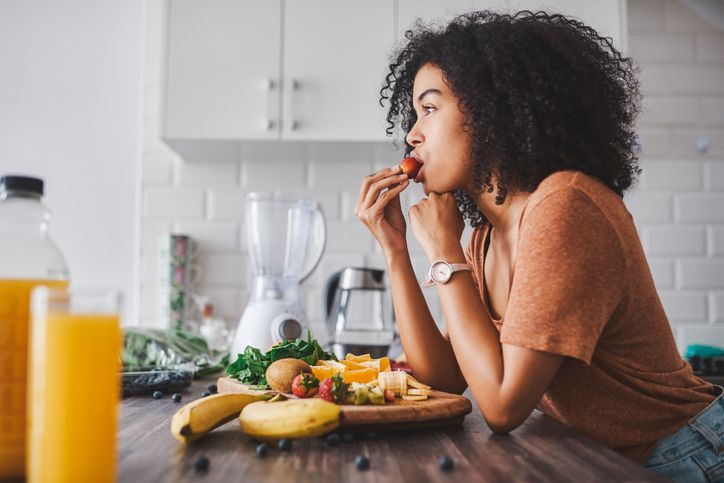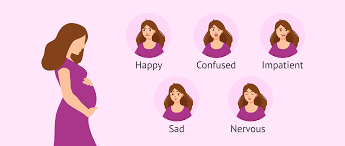If the luteal phase had a soundtrack, it would probably be the sound of someone opening and closing the fridge every 10 minutes. Suddenly you want chocolate, fries, bread, soda, a spoonful of peanut butter, or something salty, crunchy, creamy—now.
Before you blame yourself for having “no discipline,” pause. Your body isn’t weak. It’s communicating.
PMS cravings are not random or shameful—they’re deeply connected to hormonal changes, emotional needs, blood sugar shifts, and your nervous system trying to comfort you. Let’s unpack why cravings intensify right before your period—and how to work with your body instead of fighting it.
Why PMS Cravings Happen (The Real Science)
During the luteal phase, your hormones are doing the absolute most:
- Progesterone rises, increasing your appetite and slowing digestion.
- Estrogen drops, which can lower serotonin (your mood stabilizer).
- Serotonin dips often trigger cravings for carbs, sugar, and comfort foods.
- Blood sugar fluctuations make you crave fast-energy foods.
- Stress hormones go up if you’re tired, overwhelmed, or anxious—bringing emotional cravings with them.
Translation: Your body is literally trying to restore balance. Carbs increase serotonin. Salt helps regulate fluid shifts. Chocolate contains magnesium, which your body may be running low on.
This is survival chemistry, not lack of willpower.
The Emotional Side: Comfort Isn’t a Flaw
PMS cravings are also deeply emotional. In this phase you might feel:
- More sensitive
- More irritable
- More overwhelmed
- More nostalgic or lonely
- More in need of comfort and reassurance
Food becomes a way your nervous system tries to self-soothe. If you’re craving “babying,” warmth, softness, or sweetness, it may show up as wanting specific foods. Again—this is not weakness. This is your emotional body speaking.
Salt, Sugar, Carbs, Chocolate… What Each Craving Means
🍫 Chocolate
The craving is usually due to magnesium deficiency + low serotonin. Chocolate temporarily improves mood.
🍟 Salty Foods
Salt cravings can be due to fluid shifts, bloating, and electrolyte imbalances in the luteal phase.
🍞 Bread, Pasta, Carbs
Your brain wants serotonin and carbs are the fastest way to increase it. This is mood chemistry—not “overeating.”
🥛 Creamy Foods (ice cream, yogurt, cheese)
These often signal a need for comfort, emotional soothing, or fat to balance hormones.
🍬 Sweets
A dip in blood sugar triggers cravings for quick sugar. PMS often disrupts blood sugar regulation.
PMS Cravings & Sex Drive: Yes, They’re Actually Connected
Many women notice their libido also changes along with cravings during the luteal phase.
When emotions run high, your body may seek both:
- Comfort food to stabilize mood
- Comfort intimacy to feel held, wanted, secure
Sometimes you want to be kissed, touched slowly, or cuddled while eating snacks. Sometimes you want sex as a way to relieve tension—other times you want absolutely nothing to do with anyone.
All variations are normal.
How to Work With Your Cravings (Not Against Them)
You don’t need to “beat” cravings—you need to support the cause behind them. Here’s how to stay balanced without forcing unhealthy restriction.
1. Eat Regularly
Skipping meals leads to blood sugar crashes → which intensifies cravings.
2. Add Protein and Healthy Fats
They stabilize your energy and reduce the urgency of cravings.
3. Choose “Upgraded Comfort Foods”
- Dark chocolate instead of milk chocolate
- Popcorn instead of chips
- Oatmeal with honey instead of pastries
- A warm meal instead of sugary snacks only
4. Check in Emotionally
Ask yourself: “Do I need food—or do I need comfort?” Sometimes the answer is both. And that’s okay.
5. Stay Hydrated
Dehydration can mimic hunger and worsen bloating + cravings.
6. Don’t Demonize Food
Telling yourself “I shouldn’t eat this” makes cravings stronger. A compassionate mindset makes them more manageable.
When Cravings Might Signal Something Else
Sometimes extreme or uncontrollable cravings can indicate:
- Vitamin or mineral deficiencies
- Severe PMS or PMDD
- Blood sugar instability
- High stress or emotional exhaustion
If cravings interfere with daily life or feel compulsive, it’s worth speaking with a healthcare provider.
The Real Takeaway: Your Cravings Are Messages, Not Failures
Your body isn’t out of control—it’s asking for support. Your cravings aren’t signs of weakness—they’re signals of:
- Hormonal changes
- Mood shifts
- Emotional needs
- Nutritional gaps
- Stress or exhaustion
Instead of fighting cravings with guilt or shame, try listening to them. They’re part of your body’s intelligence—guiding you toward comfort, nourishment, and balance.
You’re not “being dramatic.” You’re being human.



